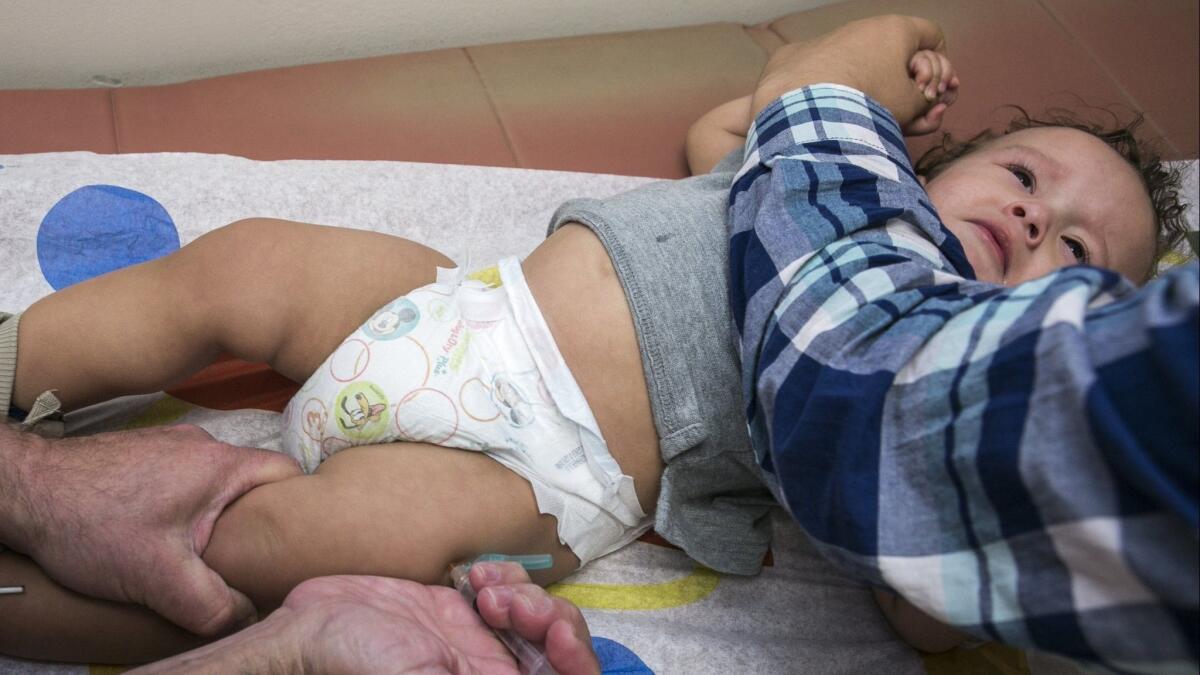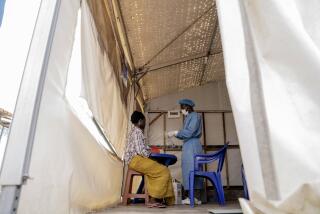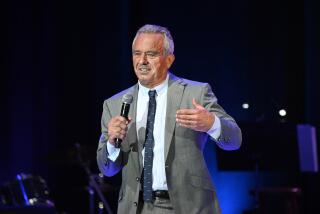Editorial: The anti-vaxx movement is a worldwide pandemic

It’s not quite six weeks into 2019, and it’s already looking like it will be another banner year for measles in the United States. An outbreak in the Pacific Northwest that began in late January continues to spread, with more than 50 cases now being reported. Meanwhile, Texas health officials on Tuesday confirmed five cases of measles in the Houston area — four of them in children under 2. And health officials in New York are still dealing with an outbreak of measles from late 2018 among orthodox Jews who apparently brought the virus back from Israel.
The global measles picture is even gloomier. A large and ongoing measles outbreak in the Philippines has killed at least 50 people, and may have spread to Australia. Nearly 12,000 measles cases have been reported in the Ukraine in the first month of 2019. And more than 28,000 cases have been reported in Madagascar since 2018. New cases are popping up all the time. For example, last week authorities in Manchester, England, urged residents to get vaccinated after a local case of measles was confirmed.
All in all, in just the last few years there has been a 30% increase in measles worldwide, according to the World Health Organization.
Parents need to understand that vaccines save lives.
How has this disease that was once considered all but eliminated in the U.S. and other developed nations, surged back to life? According to international health officials, the same anti-vaccination fear-mongering that has been at work in the U.S is contributing to a decline in vaccination rates, and measles outbreaks around the world.
About 85% of children worldwide have received at least one of the two recommended courses of the MMR (measles, mumps, rubella) vaccination, which is high but still below the ideal 95% rate that scientists say is necessary to stop outbreaks from spreading. And that percentage has stalled over recent years, and in some places has actually declined. Not surprisingly, some of the declines have been in in poor countries with limited access to health care. Economic hardship and political unrest have certainly contributed to the incidence of infectious disease in some places. The breakdown of Venezuela’s health care system, for example, drove a major 2018 outbreak in that country, which has spread to other parts of South America.
But developed countries with strong health care systems have become measles hot spots as well. Last year, France and Italy, had huge measles outbreaks that the World Health Organization says was driven not by lack of access to immunizations, but by a lack in trust in their efficacy. This distrust, called “vaccine hesitancy,” is such a threat to public health that it is on the World Health Organization’s list of top 10 global health concerns for 2019.
This distrust of vaccinations — which is all too common in the United States as well — is easily spread over social media, where a debate rages about whether the medicines themselves are dangerous. One persistent but entirely groundless fear is that vaccines cause autism. There’s no data to back up that assertion, and there is scientific evidence — quite a lot of it — showing that vaccinations save lives. But the narrative is durable particularly because the threat of measles — which has been virtually absent for a generation — is to many people more distant than autism.
Enter the Fray: First takes on the news of the minute »
Domestically, measles is breaking out in states — Washington, Oregon and Texas — that allow parents to opt out of vaccinations for their kids on the basis of their “personal beliefs.” California used to be one of those states until a serious outbreak at Disneyland in 2014 woke lawmakers to the fact that the “personal belief” exemption had been allowing childhood immunization rates to decline to dangerous levels. With measles so easily transmittable, populations with low vaccinations rates can be at risk from an outbreak half a world away.
In some places, it is understandable why people are skeptical of what they’re told. The lack of confidence in measles vaccinations plummeted in the Philippines in recent years after the maker of a government-sanctioned vaccination for dengue fever admitted it would not protect some children and perhaps even make them sicker.
Around the world, too many people seem to believe that vaccinations don’t really matter any more. Loose vaccination rules contribute to that sense. But those attitudes must change. Parents need to understand that vaccines save lives.
Follow the Opinion section on Twitter @latimesopinion and Facebook
More to Read
A cure for the common opinion
Get thought-provoking perspectives with our weekly newsletter.
You may occasionally receive promotional content from the Los Angeles Times.










